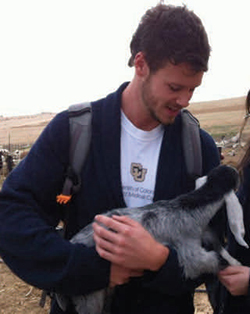On his way to medical school, Devin Patchell ’09 took a global path—to the Negev Desert of southern Israel.
One family at a time, he is helping Bedouins and nomadic people with little access to medical care establish a multi-generational shift toward preventive health care based on their unique needs.
He also has endured air raid sirens and missile attacks as tensions escalated last fall, and he studies under Israel’s Iron Dome with a bomb shelter in his apartment. Watch his videos and interview with WCPO-TV and the Kentucky Post.
Patchell graduated from Ohio University in 2009, majoring in Chemistry and Biochemistry. He earned an MPH from the University of Colorado School of Public Health, and then he chose to continue learning about public health in a global setting. He is currently a second-year medical student at the Medical School for International Health (MSIH) at Israel’s Ben Gurion University, which provides opportunities for community involvement in Be’er Sheva. MSIH is in collaboration with Columbia University Medical Center and is a North American-style medical school that incorporates global health coursework into all four years of the medical school curriculum.
“Be’er Sheva is a true melting pot,” explains Devin. “Here, I have an opportunity to practice working in health care across many different cultures: Ethiopian immigrants, Bedouins, Orthodox families, etc. Though Israel has a very comprehensive health care system, many families out of the Be’er Sheva city limits are restricted in the care they receive because of cultural and social barriers. The Bedouin populations live largely without electricity and basic hygiene becomes an issue.”
“With support from his Rotary International Student Scholarship funds, Devin is working on grassroots approaches to improving health care, one family at a time. For his project, Devin took his inspiration from the Gandhian Model of Care, a public health program that originated in India,” according to the University of Colorado’s Global Health Link. “The program offers a sustainable method of educating and facilitating preventive care among impoverished communities. “Devin adapted the Ghandian model to focus more on the family-unit rather than the community-unit. Ideally, his approach will establish a multi-generational shift toward preventive health, and will allow families to focus on their specific needs, which may be unique from other families in the vicinity. Using his scholarship funds to purchase log books and acquire transportation to and from these small desert communities, Devin hopes to expand the project to include as many as 35 students working with 20 families, to address issues such as nutrition, disease management, hygiene, and water and sewage management.”
“For instance, Devin recently made a home-care visit to a Bedouin family outside the city,” continues the Global Health Link article. “The grandfather of the family was diabetic and had difficulty monitoring his blood glucose, and his food options were restricted due to his pastoral and semi-nomadic lifestyle. Given these challenges, the family had difficulty accommodating the grandfather’s needs. After several visits from medical students and a social worker, the grandfather is now learning techniques to monitor his own blood glucose, and the family is adapting to the patient’s dietary needs while still including him in family meals, which is a cultural imperative.”
“I hope to work in a field of medicine that involves both the micro and the macro views of health,” states Patchell. “Gaining experience creating and working in sustainable, culturally sensitive health programs now could prove invaluable in my future career in medicine. I am learning what works and what does not in health programming. Most of all, I am learning what the idea of “health” means to individuals of other walks of life, and how I can work with them to help achieve their health goals without forcing my own upon them.”
“Devin will make a fine doctor soon,” says Ann LaComb, pre-professional adviser in Ohio University’s College of Arts & Sciences, Department of Biological Sciences. “He made a good choice and will leave his mark on the community there!”
A comprehensive article on Devin’s project can be found here, in UC Denver “Global Health Link” newsletter. http://www.ucdenver.edu/academics/colleges/PublicHealth/research/centers/globalhealth/about/Documents/GlobalHealthLink26.pdf

















Comments